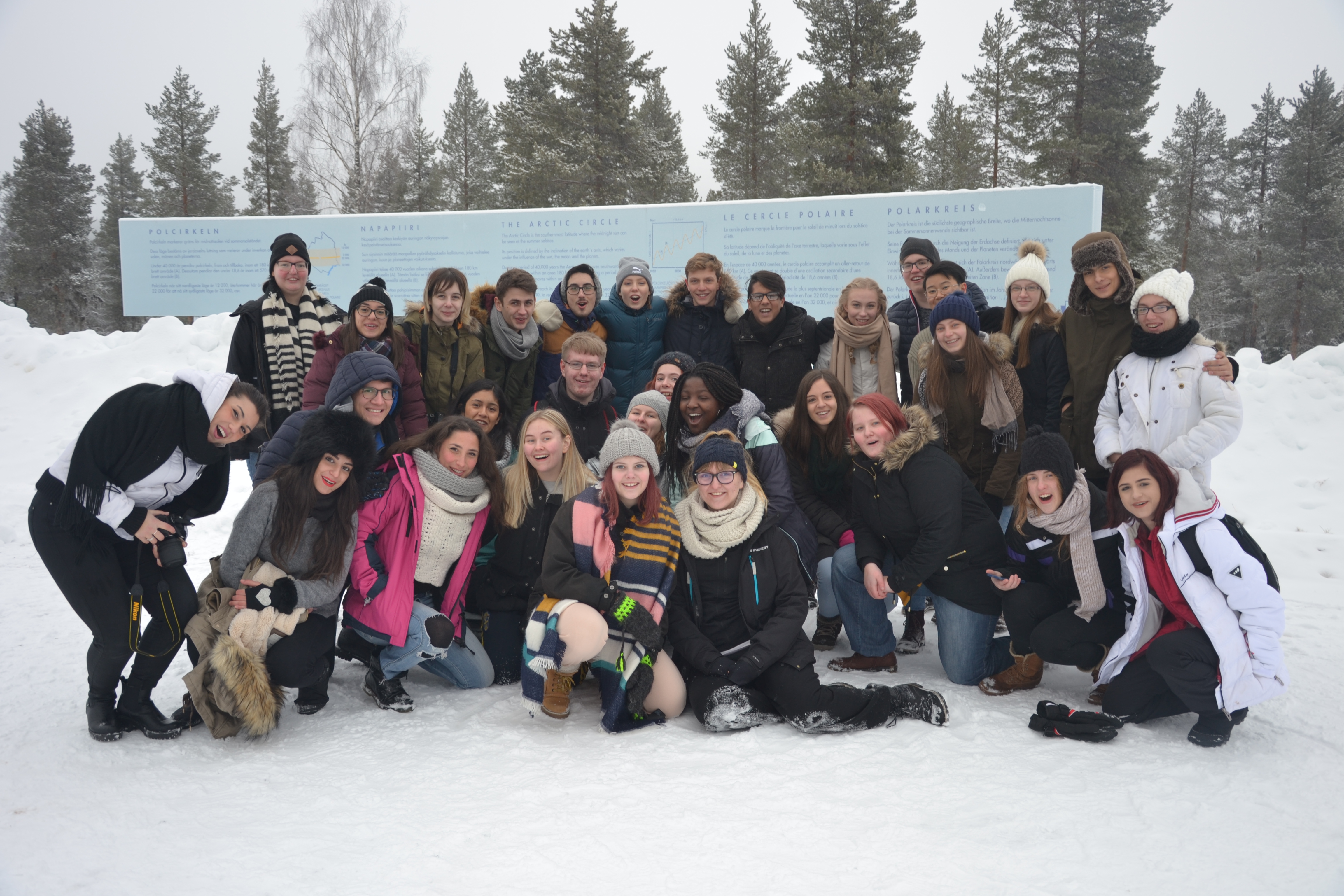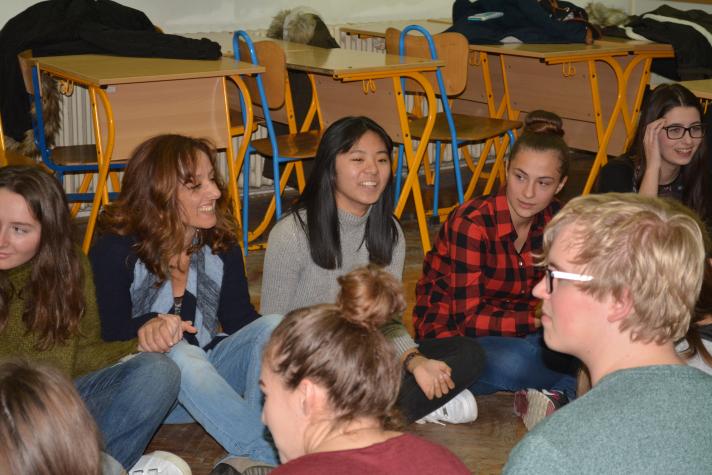
Topic(s) addressed
The project’s main objectives were to promote tolerance, equality and human rights, the teaching profession, and skills required in the teaching of students, with its goals being to raise awareness on the topic of (in)equality among different (minority) groups; the promotion of tolerance, empathy and open-mindedness; and, the teaching of basic human rights, accountability, and active citizenship. Additionally, the project also sought to increase critical thinking; encourage suitable candidates to join the teaching profession; encourage reading and speaking skills; improve English language skills through direct communication in the English language; and, improve IT skills. Blended learning was carried out during the preparation of pedagogical workshops (the project’s main output), with said workshops being led by students in the form of peer education. As a result, 74% of students estimated that their IT skills improved through the use of various digital tools during the preparation of movies and presentations for each module.
Target groups
Project participants consisted of high school students from 6 countries (Croatia, Sweden, Italy, France, Spain, and Romania); of the 24 Croatian students who participated in the project’s activities, 8 came from categories that were characterised as having fewer opportunities due to economic and/or geographic obstacles.
Methodologies
The primary method in the achievement of predetermined goals was the development and implementation of pedagogical workshops – a method of social learning in which students create and moderate workshops for their peers, with teachers only providing mentorship during the preparation phase. Teachers ensured that students who moderated the workshops were well prepared, familiar with the issues being addressed, open-minded, respectful, and confident, with all students having undergone a training period prior to the implementation of the peer-to-peer workshop. Once students were capable of independently moderating such workshops, they then assumed the role of a teacher within the classroom environment. Students gained insight into the teaching process through the planning and implementation of workshops, with their evaluation and amendments approaches aimed at meeting the needs of specific groups. Peer education, both as a learning method and as a project objective, enabled students to gain theoretical knowledge in a number of fields, including on laws relating to gender equality; religious history; the treatment of people with lesser opportunities; and, the origin and use of languages in one’s own country as well as in the countries of project partners – all of which helped students familiarise themselves with prominent figures and the fight for equality in the aforementioned fields.
Environments
The IMAGINE project was primarily aimed at promoting equality, tolerance, and human rights. This is reflected in its name (IMAGINE), which was inspired by John Lennon’s song by the same name, which promotes similar values. The title also functioned as an acronym for the following values: I = impartiality, M = magnanimity, A = altruism. G = good-heartedness, I = idealism, N = nobility, and E = equality. A number of activities and methods were engaged in the project’s development, comprising preparatory organisational activities prior to the short-term student exchange; the organisation of similar activities for each short-term student exchange; and, other associated activities including the creation of the project’s logo and website; the development of an informational leaflet and pedagogical workshop booklet, as well as the project’s artwork. Workshops were also implemented in other regional schools, with cross-sectoral cooperation having included the implementation of pedagogical workshops outside of the Erasmus+ IMAGINE team (13 different workshops were organised with 55 different student groups, comprising 7 primary schools, 4 other secondary schools, and a kindergarten); presentations of the project to the regional council of school counsellors, the regional council of sociology teachers, the regional council of English teachers, and the regional council of biology teachers; a presentation of the project during a public lecture organised by the regional committee for gender equality; and, project dissemination activities within the local community (Internet articles, articles in local newspapers, reports on educational radio shows, participation in a TV show, an 8-page report on the project in the school magazine, presentation of the project at the city library, and the project’s website). As previously mentioned, one project output was the publication of a booklet on selected pedagogical workshops with instructions in English.
Teachers
Teachers who were involved with the project had the opportunity to interact with various cultures, and understand different school systems and ways of life. Given that the project’s official working language was English, teachers and students were able to practise their speaking and writing skills throughout the project’s duration, in addition to improving their IT skills due to the various tools used in each module towards the preparation of movies/presentations. Furthermore, teachers noted the project’s benefits in the development of critical thinking skills, improvement in communication skills, the fostering of creativity, an increase in students’ sense of responsibility with regard to the activity’s outcome, as well as the provision of a safe platform where the exchange of opinions could take place. Participating teachers were provided with an informational leaflet at the beginning of the project, and were informed beforehand of its primary goals, methods, and activities. In 2017, the project and its method were presented at the TCU (Tjedan Cjeloživotnog Učenja/Week of Lifelong Learning) event in Đurđevac, where participating teachers were informed about the Erasmus+ programme, the IMAGINE project, short-term student exchanges, and methodological considerations relating to the pedagogical workshop so they may apply it to their work with students.
Impact
All project participants learnt how to create and implement a pedagogical workshop – an important outcome given that the method was a fundamental project tool. Furthermore, all students who were involved with the project acquired basic classroom management skills through the implementation of workshops, which provided them with valuable insight into teaching processes through the planning, implementation, evaluation, and amendment (to fit the needs of specific groups) of workshops. Moreover, students gained theoretical knowledge on laws relating to gender equality, religious history, the treatment of people with lesser opportunities, and, the origin and usage of languages in their respective countries (including those of project partner countries), while familiarising themselves with prominent figures in the fight for equality from various fields. Lastly, workshops continued to be carried out across partner schools with the younger generation, so as to ensure that these younger students will be able to continue implementing such workshops once older project partner students have completed their schooling.
- Reference
- 2016-1-HR01-KA219-022165
- Project locations
- Croatia
- Project category
- Secondary education
- Project year
- 2021
Stakeholders
Participants
Björknäsgymnasiet
- Address
- Sweden
IES Pedro Espinosa
- Address
- Spain
ITE Marco Polo
- Address
- Italy
Liceul Teoretic "Mihail Sadoveanu"
- Address
- Romania
Lycée International Charles de Gaulle
- Address
- France

